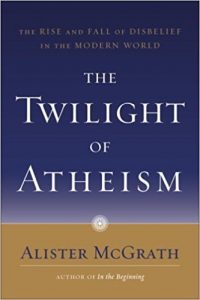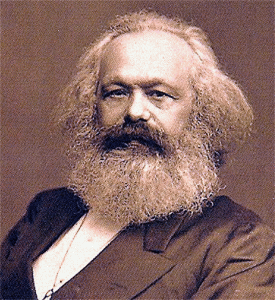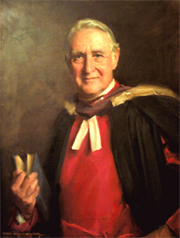The Collapse of the Christian Mind

David H. C. Read stepped into the pulpit that morning. Newly called as the church’s Senior Minister, he launched into a consideration of eternal life, a subject that Lin found interesting.
To engage the mind of Lin Yutang was no small achievement. Author of countless books on Chinese culture, educated at Harvard and holding a doctorate from the University of Leipzig, Lin Yutang was a renown intellectual, both in his native China and in the English-speaking world. Lin had even gone to seminary to prepare for ministry in the footsteps of his father. Lin’s family had responded two generations back to the gospel message brought to China by missionaries.
But Lin hated Church.
Despite a wonderful childhood in a devout home; despite unparalleled schooling in theology, the winsome messages of Confucianism and Buddhism touched Lin’s heart and head. By stages, he left seminary studies, dropped all pretext of being a Christian, and claimed paganism as his working religion.
Then came that sermon by David H. C. Read.
Lin and his wife attended church together again. And again. Lin opened up the pages of the gospels for the first time in decades and considered afresh what Jesus was saying. Lin Yutang’s entire value system shifted and, entering his 7th decade of life, found himself agreeing with his whole being the words in the middle of John 14:9, “ …He who hath seen me, hath seen the Father…”
The State of Our Congregations
That was in the late 1950’s. Had Lin attended a Protestant Church today, there would be a fair chance that the sermon hadn’t even been written by the preacher–but purchased. Eye-popping numbers of churches now outsource sermons and sermon-series, saving the pastor long-hours in front a yellow pad and a pile of reference books. With corporation produced, focus-group endorsed materials, a modest congregation can present flashy publications, power point slides, hand-outs for classes, and trendy messages for on-the-go worshipers. I wonder how Lin’s robust critique of churches would have sized up today’s congregations.

It’s not news that the Christian movement in America is in alarming decline. The country’s largest denomination, the Southern Baptist Convention, started reporting membership slippage in 2007. My church, the Presbyterian Church, USA has been losing members since 1966. I muse at the fact that in the years between my ordination in 1977 and the conclusion of my last call in 2017, about half of my denominations membership walked out of the doors, never to return. The decline in Christian America is well documented and well-known.
The Loss of Leaders in Christian Thought
What is new for me is the realization that the inconspicuous parts of the Christian ecosystem are disappearing. For example, seminaries are shrinking along with the ministerial candidates to fill them.
Graduate theological education, which prepares the theologians of the future, is also drying up. Newly minted Ph.D’s in theology are working as baristas in Starbucks or staying home with the children instead of standing in lecturing eager seminarians.
Theological book publishing is having trouble selling books in a climate when reading in general is in decline. One example of this is the sale of the theological arm of Fortress Press to Rowman and Littlefield. As with all business consolidations, this one is an adaption to the receding world of sophisticated theology and the readership that consumes it. Several years back saw the absorption of the Albin Institute by Duke Divinity School. For the first 35 years of my ministry, Albin was a mainstay organization for ideas and help. Now as with all businesses in trouble Albin is selling off its assets and being absorbed.a church consultancy resource and publishing operation
The days when great Christian minds, like the Neibuhr Brothers, Paul Tillich, Deitrich Bonhoeffer and Karl Barth or even Martin Luther King appear to be fading away. The sense that smart people are pointing the way forward for the Christian movement is eroding away.
Creeping Atheism
Several of these would-be teachers and writers, having given up on academic placement, are also giving up on faith itself. Atheism is fashionable again. As recently as 2004, Alistair McGrath penned his overly optimistic Twilight of Atheism, which pronounced disbelief dead. His critics pushed back, saying that McGrath had not made his case with enough rigor. But McGrath’s methodology is mote today. Atheism is measurably surging. One feature of the new atheists that distinguishes them from their non-believing predecessors is their militancy in ridiculing the church.
The Battle of Ideas
Why does all of this matter? My answer is that we live in a time that is intellectually comparible to the gladiatorial games in Ancient Rome. The arena today is gloriously full of combatants. In our postmodern environment virtually every ideology, political, religious, and psychological has marched out into the coliseum and is ready for battle. If you’re a philosopher or journalist; if you love ideas; this ferment is exciting. If you’ve made up your mind what your values and politics are and don’t want to have your principles up in the air, this is an upsetting time.
If you’re a committed Christian, there are few contenders in the arena to do battle for what you believe in.
Take today’s news. Yesterday’s mid-term elections, which swept many Democrats into office, also swept in a few socialists as well. I’ll cite one example as substantiation of this assertion. In Virginia, the Democratic Socialists of America managed to push its candidate, Lee Carter, past GOP whip Jackson Miller for a seat in the House of Delegates.
Marxism is surging. The far left’s intellectual vanguard has been unobtrusively writing and growing for some time. Self-professed socialist, Bernie Sanders, is one of the most popular politicians in America today.

I’m holding on to a hunch that the principles of the American Constitution are under subtle review. Consider Russian president, Vladimer Putin’s popularity among conservatives and surprisingly, evangelicals. What could possibly be appealing about a former KGB agent and strongman who is trying to recover the glories of the Soviet Union? I would propose this: he’s strong. The American constitutional project of including everybody, belaboring decisions, allowing ridicule of religion, and tiptoeing around everybody’s rights is insufferably annoying to people who just want to get on with restoring the US’s purported glories of the past. Russia today doesn’t mess with identity politics and political correctness. Many Americans wish their own leaders would follow suit. Decisiveness is a winner in postmodern America.
But is this yearning a departure from the spirit of Alexander Hamilton and James Madison? I’m just wondering these days if even American constitutionalism is out there in the arena needing to prove itself among the other warriors…and the crowd.
Conclusion
Here’s where I’m not going with this. I’m not saying that everything Christian is on death watch. There is a contraction in the Christian movement. I happen to believe that an awakening will bring bracing vitality back to our faith.
Here’s where I am going with this. There’s a glorious ferment underway. We’re in a fluid situation where old ideas left for dead are back. Is Christian faith also in there there with the other confident combatants? Are the big ideas that flowed from Israel and the Christ-event even part of the debate? Is the biblical view of the character and prospect for a human being up for discussion? Is the Christian view of history or God’s providential engagement with Creation in contention for allegiance of today’s thought leaders?
I’m concerned about the answer to these questions.
Lin Yutang entered his own version of the arena of ideas by virtue of the fact that his international lifestyle landed him in the midst idea warriors all around. In the process Lin’s Christianity got pretty beaten up. He spent a long time in the far country. Our time and our situation are eerily like Lin’s. And we’re probably in for the quite a melee.
Will there be a David H. C. Read when we need him?
What Can We Do in the Meantime?
What to do?
1.Congregations need to teach Church History. In the best of teaching congregations, the Bible is under study and even some theology is introduced. But the two thousand years of Christian experience is lost to us because we just haven’t gotten around to exploring it.
2.Why not send non-ministers to seminary? What if the adult Bible study teacher filled a seat in a seminary Old Testament class? Arrange for the whole choir to sit in on a class in Christian Worship. A class in 19th century Church History would vitalize a missions committee and enrich their sense of outreach. Give the Senior High Fellowship a pre-college experience by letting them sit in on a class on the evangelical movement.
3.Replace church libraries with little book stores and stock them with the best of contemporary Christian publishing. Let it be a project of the High School Fellowship—they buy the stock, manage the cash register and keep the profits for their program. Place the old library books out on tables and let the congregation take them home. Put all the old Sunday School curriculum and old hymnbooks out on the tables as well. After the congregation and the soup kitchen guests have picked over the free books, place whatever remains in the church dumpster. Let the buildings and grounds committee head up this one. They won’t care about the books, but they’ll love the facelift for the facility.
4. Make up your mind that you are going to have to start from scratch in explaining what Christian faith is and why it is important. That information doesn’t just trickle down from previous generations any more. Everyone who steps into your church is a blank slate as far as faith is concerned. Everything needs to be re-established.
4.Hang in there knowing that you may be overwhelmed and feel ridiculed. But God’s purposes have a way of working out—eventually.

